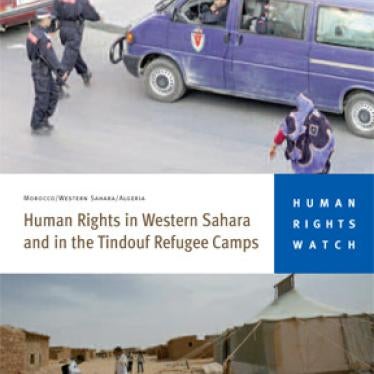(Washington, DC) - The Polisario Front, the Western Sahara independence movement, should release a dissident detained on September 21, 2010, if the real reason for his arrest is his vocal support for Morocco's autonomy plan, Human Rights Watch said today.
Polisario security forces arrested Mostapha Selma Sidi Mouloud, a police officer, as he travelled toward the Polisario-run Sahrawi refugee camps near Tindouf, Algeria. His arrest followed a visit to Moroccan-controlled Western Sahara, during which he publicly declared his support for Morocco's proposal to resolve the conflict over the disputed territory's future by granting it autonomy under Moroccan sovereignty.
"Selma publicly praised Morocco's solution to the conflict and said he would return to Tindouf to defend it, which is his right," said Sarah Leah Whitson, Middle East and North Africa director at Human Rights Watch. "If the Polisario Front wants to show that they are not persecuting Selma for his views, it should free him immediately or ensure that he receives a fair and transparent trial on credible charges."
The Polisario Front, which administers Sahrawi refugee camps in Algeria with the approval and support of the Algerian government, demands a popular referendum on the political future of Western Sahara. Morocco has administered the territory de facto as if it were part of its own territory since seizing control over it when Spain, the former colonial power, withdrew in 1975.
A UN-backed plan to organize a referendum was set in motion in conjunction with a Polisario-Morocco ceasefire in 1991, but stalled in the face of opposition from Morocco. Morocco rejects independence as an option for Western Sahara and has proposed instead a measure of autonomy under continued Moroccan rule.
In the Sahrawi refugee camps in Algeria, support for Morocco's autonomy plan is rarely heard publicly. The Polisario Front and its supporters consider Morocco an occupation force in their homeland and its autonomy proposal a denial of Sahrawis' right to self-determination.
While Selma is not the first Sahrawi refugee to return to Western Sahara and back Moroccan sovereignty, he may be the first to have done so in so public a fashion and then announced that he would return to Tindouf to defend this position.
In a statement issued today, the Interior Ministry of the Sahrawi Arab Democratic Republic (SADR), the state proclaimed by the Polisario Front, said it had arrested Selma yesterday for espionage on behalf of "the enemy [Morocco]," to which he had "publicly pledged loyalty" and "divulged secrets" relating to Sahrawi institutions. The statement said that Selma would be referred to Sahrawi justice under the terms of the SADR's penal law relating to "espionage" and "treason."
Selma reportedly had no prior political profile in the refugee camps, where he lives in el-Ayoun camp with his wife and five children.
At a news conference on August 9 in Smara, Western Sahara, Selma praised the autonomy plan as a viable third option between independence and full integration into Morocco.
Following Selma's news conference, Polisario officials promptly denounced "traitors" to the cause, in an apparent reference to him. The next day, Brahim Ghali, the Polisario ambassador to Algeria, declared, "Traitors would in no way deter the Sahrawi people in pursuing their struggle for self-determination."
Reached today by telephone in Smara, Mohamed Sheikh, Selma's brother, said his family in the Tindouf camps did not know where he was being held. Late in the day, a Polisario source informed Human Rights Watch that he was being held in Mehrez, in the small section of Western Sahara that it controls.
Human Rights Watch urged the Polisario to disclose Selma's precise whereabouts, to provide him prompt access to his family and a lawyer, and to bring him promptly before an independent judicial body to determine whether there is a well-founded basis for his detention.
Human Rights Watch also reminded Algeria of its responsibility to guarantee human rights of all persons on its territory, whether or not the state has, de facto, ceded supervision of the Sahrawi refugee camps to the Polisario Front.







